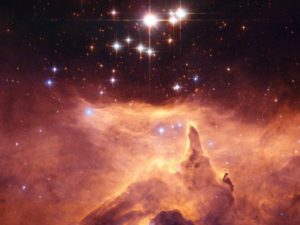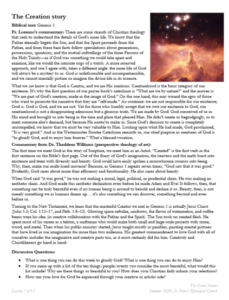
Biblical text: Genesis 1
Fr. Lorenzo’s commentary: There are some strands of Christian theology that seek to understand the details of God’s inner life. We know that the Father eternally begets the Son, and that the Spirit proceeds from the Father, and from these bare facts follow speculations about generations, processions, spirations, and the mutual indwellings of the three Persons of the Holy Trinity—as if God was something we could take apart and examine, like we would the intricate cogs of a watch. A more reserved approach, and one I agree with, takes a different angle: the inner life of God will always be a mystery to us. God is unfathomable and incomprehensible, and we cannot mentally picture or imagine the divine life in its essence.
What we can know is that God is Creator, and we are His creations. Creaturehood is the basic category of our existence. It’s why the first question of our prayer book’s catechism is “What are we by nature?” and the answer is: “We are part of God’s creation, made in the image of God.” On the one hand, this may wound the egos of those who want to promote the narrative that they are “self-made.” Au contraire: we are not responsible for our existence; God is. God is God, and we are not. Yet for those who humbly accept that we owe our existence to God, our creaturehood is not a disappointing admission but a glorious truth. We are made by God! God conceived of us in His mind and brought us into being in the time and place that pleased Him. He didn’t create us begrudgingly, or to meet someone else’s demand, but because He wanted to make us. Since God’s decision to create is completely uncompelled, we know that we must be very valuable to Him. Looking upon what He had made, God proclaimed, “It is very good.” And as the Westminister Shorter Catechism reminds us, our chief purpose as creatures of God is “to glorify God, and to enjoy him forever.” What a blessed vocation.
Commentary from Dr. Thaddeus Williams (perspective: theology of art):
The first time we meet God in the story of Scripture, we meet him as an Artist. “Created” is the first verb in the first sentence on the Bible’s first page. Out of the flurry of God’s imagination, the heavens and the earth burst into existence and teem with diversity and beauty. God could have easily spoken a monochrome cosmos into being. Why, then, make our multi-hued universe? Because, as Genesis 1 repeats seven times, “God saw that it was good.” Evidently, God cares about more than efficiency and functionality. He also cares about beauty.
When God said “it was good,” he was not making a moral, legal, political, or prudential claim. He was making an aesthetic claim. And God made this aesthetic declaration even before he made Adam and Eve! It follows, then, that something can be truly beautiful even if no human being is around to behold and declare it so. Beauty, then, is not merely something we as humans dream up… it’s also something we can discover, something beyond and even before us.
Turning to the New Testament, we learn that the masterful Creator we met in Genesis 1 is actually Jesus Christ (John 1:3; Col. 1:15–17; and Heb. 1:8–13). Glowing space nebulae, rainbows, the flavor of watermelon, and coffee beans were his idea (in creative collaboration with the Father and the Spirit). The Son took on created flesh. He spent most of his career as a tekton, a craftsman who could make both small and large-scale projects with stone, wood, and metal. Then when his public ministry started, Jesus taught mostly in parables, painting mental pictures that have lived in our imagination for more than two millennia. His greatest commandment to love God with all of ourselves includes the imaginative and creative parts too, as it most certainly did for him. Creativity and Christlikeness go hand in hand.
Discussion Questions:
- What is one thing you can do this week to glorify God? What is one thing you can do to enjoy Him?
- If you came up with a list of the ten things/people/events you consider the most beautiful, what would this list include? Why are these things so beautiful to you? How does your Christian faith inform your selections?
- How can your love for God be expressed through your creative or artistic side?



Comments are closed.